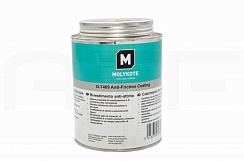Anti-Friction Coating Molykote
7409


Description
This item’s formula has been modified: N-Methyl-2-pyrrolidone was excluded. New material instead of this one is Molykote D-7409.
Operating temperatures
-70°C +380°C
- Applications
- Friction units
- Advantages
- Problems to be solved with this material
- The combination of materials
- Features
Applications
FEATURESOutstanding lubrication, coupled with corrosion protection properties
High load carrying capacity
High wear resistance
High temperature resistance
Resistant to oil, grease, solvents
Avoidance of fretting corrosion
APPLICATIONS
For metal/metal combinations with slow to moderately fast movements and moderate to high loads.
Suitable for highly stressed sliding areas with low sliding speeds, oscillating
movements or intermittent operations.
For permanent lubrication at high temperatures and also where oils and greases cannot be used.
Used successfully for piston rings and tappets of combustion engines, magnetic armatures of vehicle starter motors, bonnet lock components.
It is used in friction
 Sliding bearings
Sliding bearings Sliding guideways
Sliding guideways Chains
Chains Enclosed gears
Enclosed gears Open gears
Open gears Piston-cylinder-group (unit)
Piston-cylinder-group (unit) Threaded connections
Threaded connections.jpg) Strips
Strips Spline / key joints
Spline / key joints
Advantages
- Cold resistance
- Termal (heat) resistance
- Higher load carrying capacity
- Chemical resistance
- Working capacity in vacuum
- Working capacity in moisture
- Working capacity in dust
- Radiation resistance
- Good anticorrosion properties (good corrosion protection)
- Good adhesion strength
- Good water washout resistance
- Good fretting corrosion protection
- Emergency properties
- Can be painted over
- Avoidance of stick-slip
- Provides constant torque for threaded connections
- Easy mounting / dismounting
Problems to be solved with this material
- Seizure
- Stick-slip motion
- Fretting corrosion
- Dust sticking onto lubricating surfaces
- Dust intrusion into lubricating points and abrasive wear
- Corrosion
- Lubricant wash-out
- Lubricant destruction of chemically active medium exposure
- Lubricant efficiency loss in vacuum
- Lubricants leaking off or emission due to centrifugal forces
- Frequent re-lubrication
- Difficult mounting / dismounting
- Unstable torque because of wide range friction coefficient
- Liquid and consistent lubricants application failure
Material combination in friction pair
- Metal - Metal
| Стандарт | Показатель | Ед. изм. | Значение |
|---|---|---|---|
| — | Состояние продукта | Снят с производства, новый продукт - D-7409 | |
| — | Цвет | Серо-черный | |
| — | Антифрикционные добавки (наполнители) | Твердые смазочные материалы: дисульфид молибдена - 15%, графит - 1,5% | |
| — | Прочие составляющие | Органический связующий агент (полиамид-имид), растворитель | |
| CTM 0242 I | Содержание нелетучего остатка | % | 31 |
| — | Диапазон рабочих температур | °С | от -70 до +380 |
| — | Температура вспышки | °C | 28 |
| DIN 53 217/2 | Плотность при 20 °С | г/см3 | 1,1 |
| — | Радиационная стойкость | рад | 108 |
| — | Срок годности при хранении | лет | 5 |
| ASTM D 2625 | Критическая нагрузка (метод Falex) для поверхности без предварительной обработки / после фосфатирования / после пескоструйной обработки | кH | -/-/14,7 |
| ASTM D 2714 | Срок службы (испытание на машине LFW-1 при вращательном движении до коэффициента трения f=0,1 при нагрузке N=2860 H, частоте вращения n=72 об/мин, скорости скольжения v=7,9 м/мин) для поверхности без предварительной обработки / после фосфатирования / после пескоструйной обработки | тыс. оборотов | -/364/- |
| ASTM D 2714 | Срок службы (испытание на машине LFW-1 при возвратно-поступательном движении до коэффициента трения f=0,08 при нагрузке N=900 H, частоте w=89,5 циклов/мин) для поверхности без предварительной обработки / после фосфатирования / после пескоструйной обработки | тыс. циклов | -/214/- |
| — | Условия отверждения (выдержка/температура) | мин/°С | 30/220 (120/150) |


